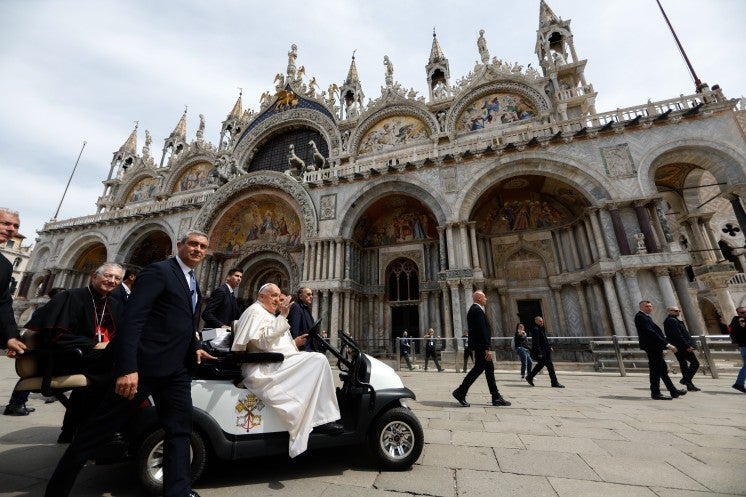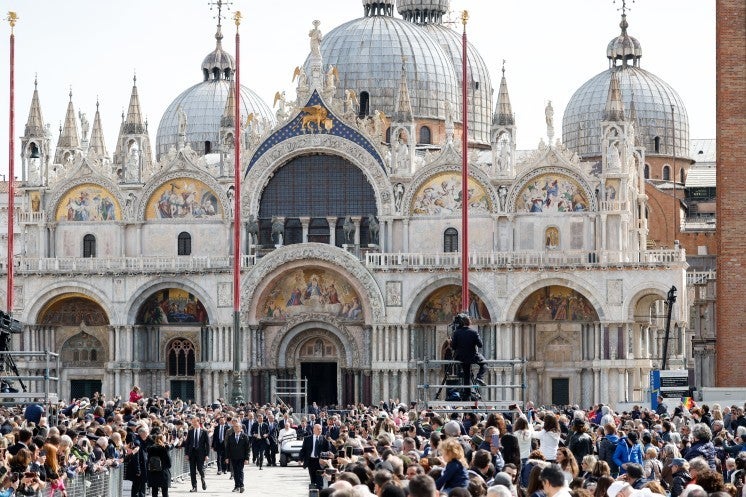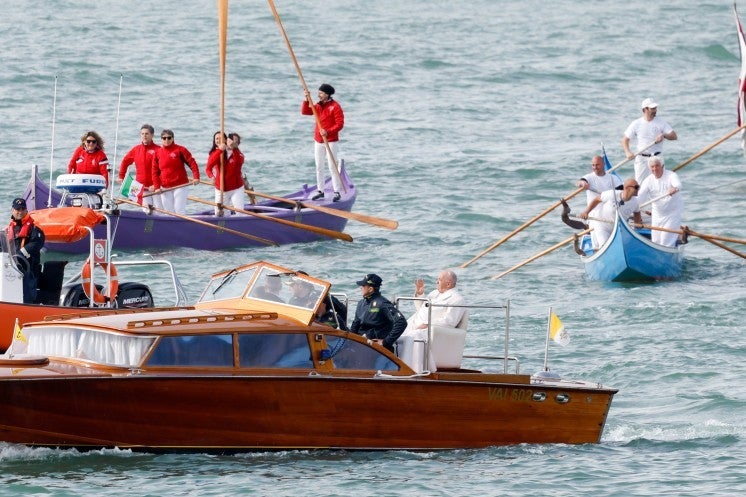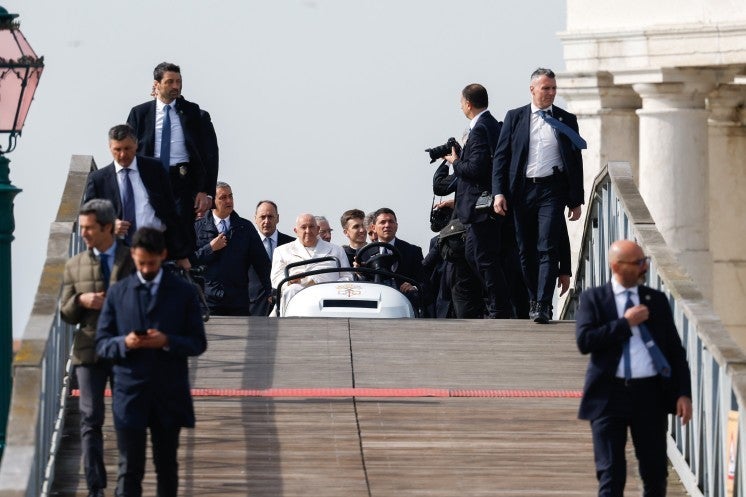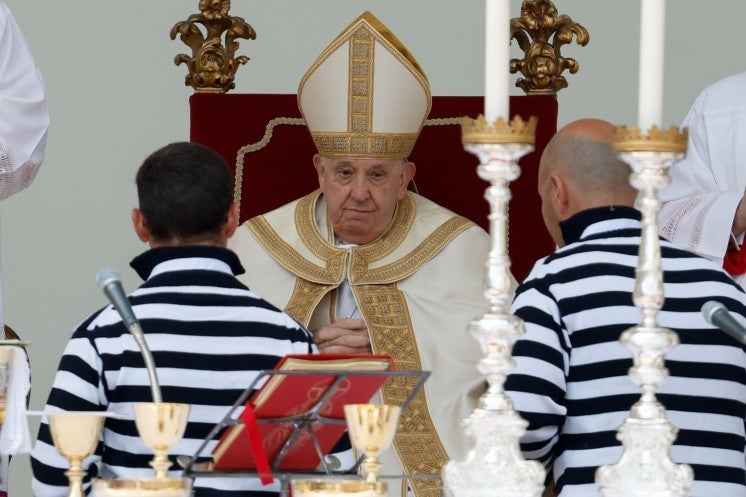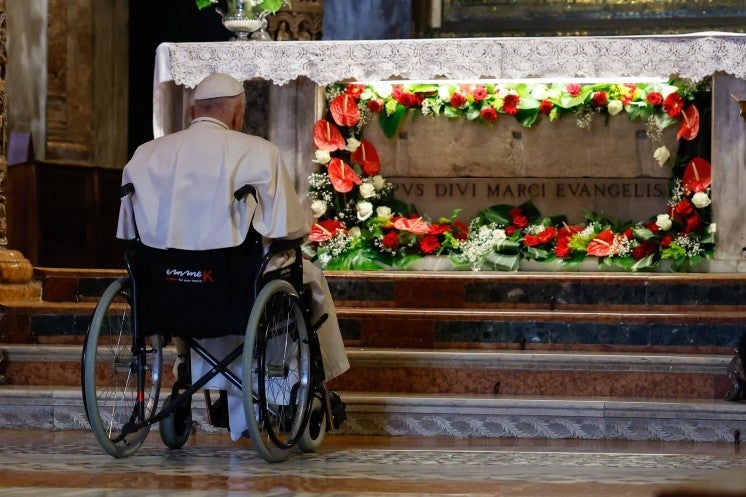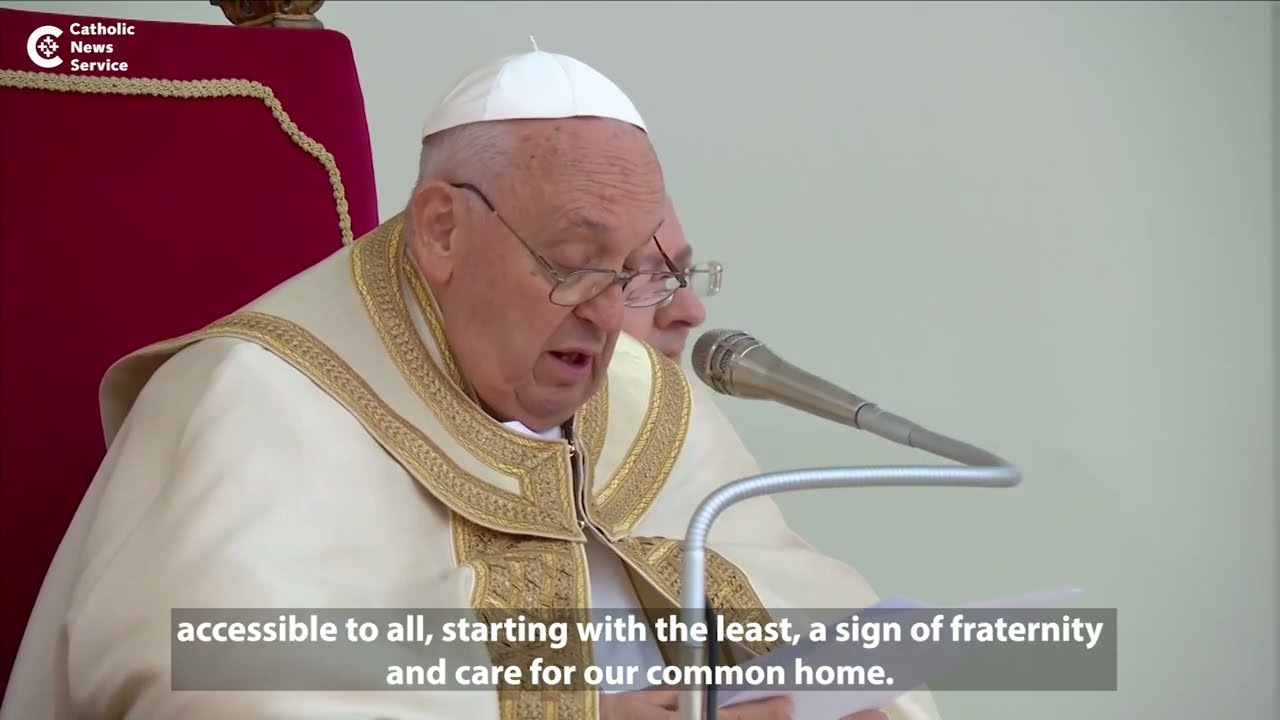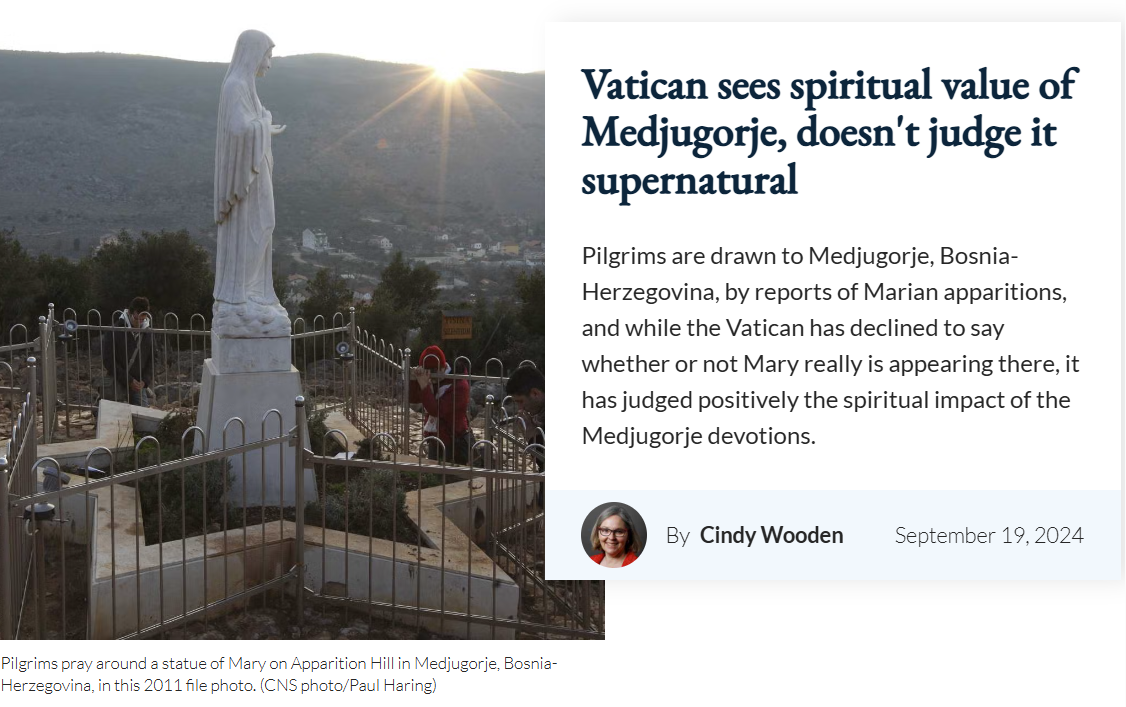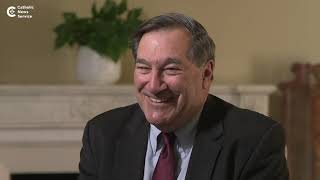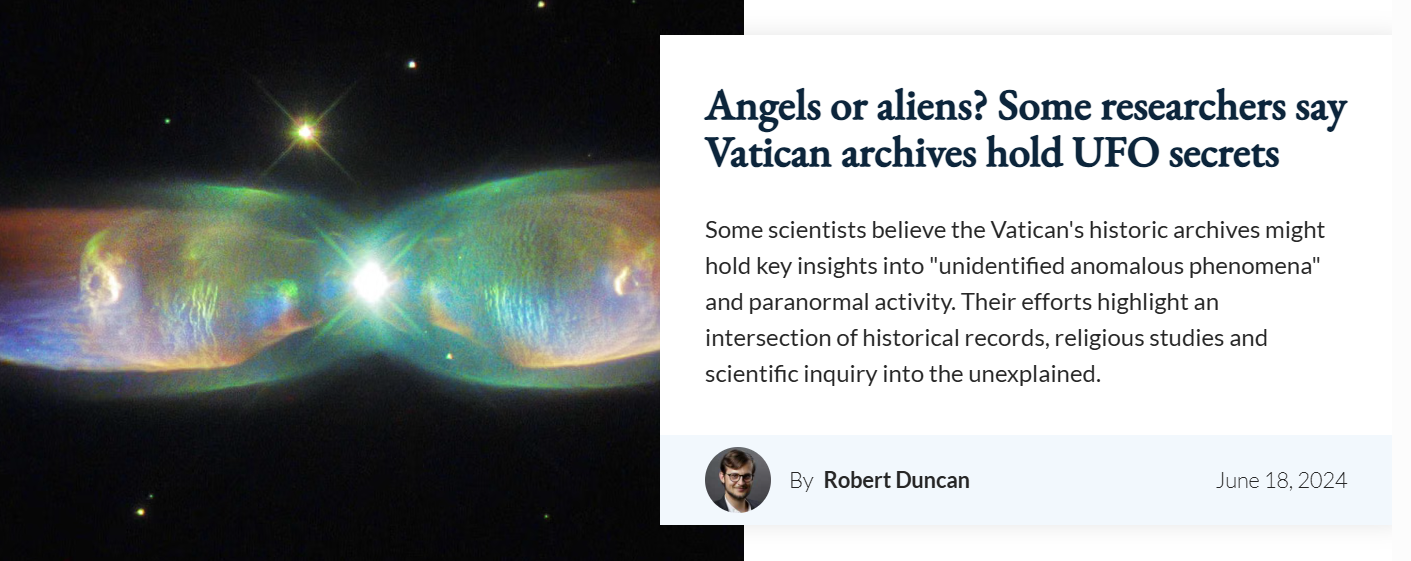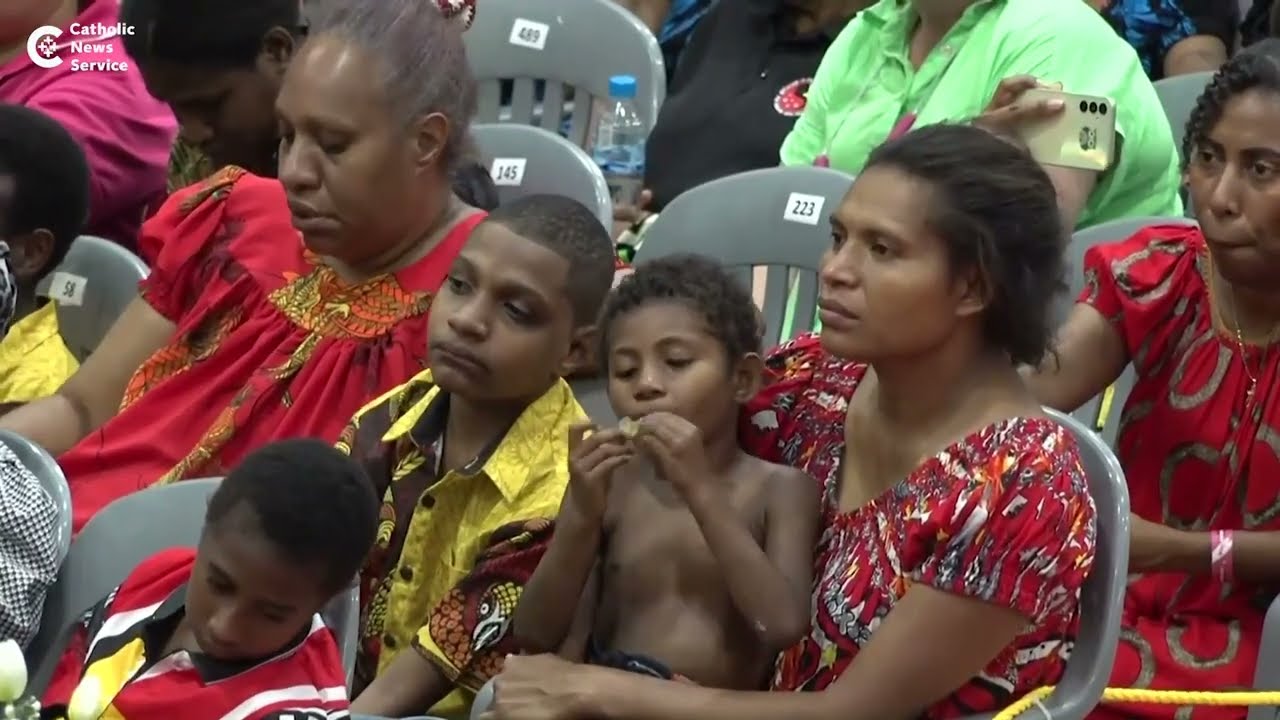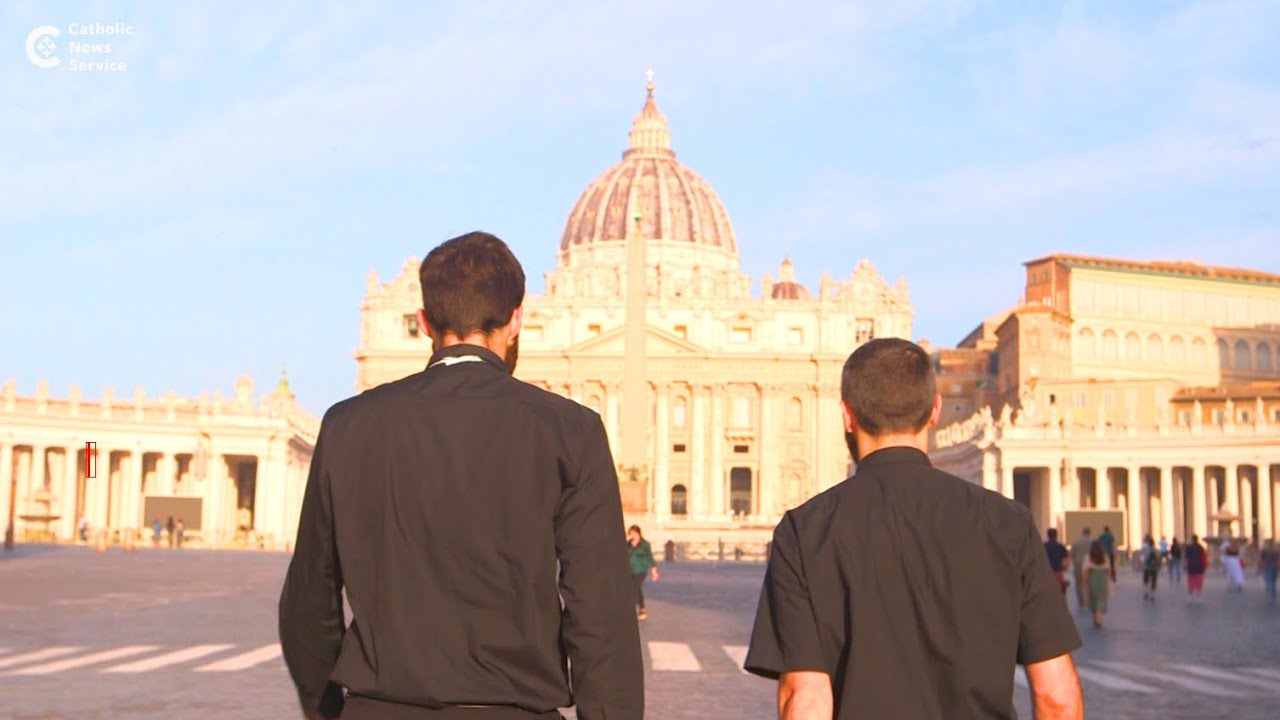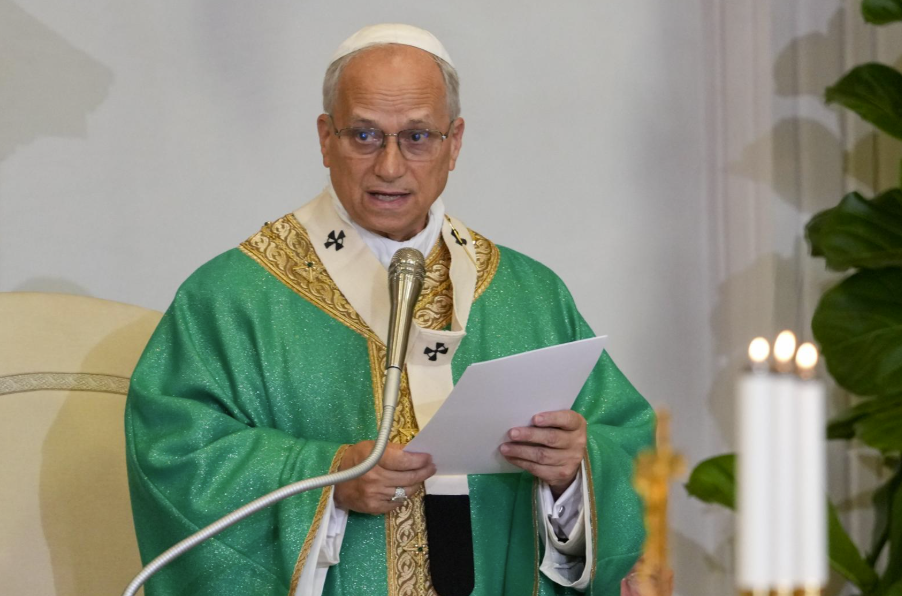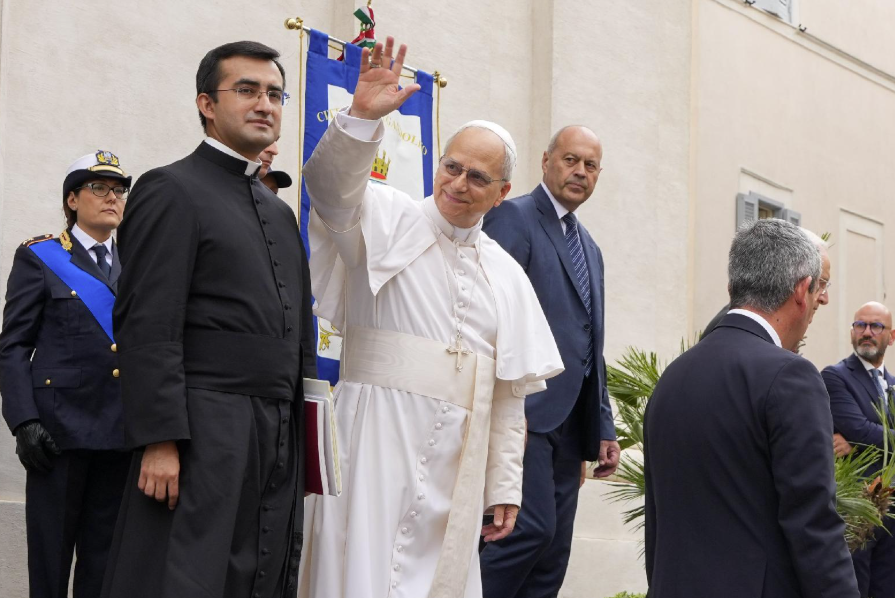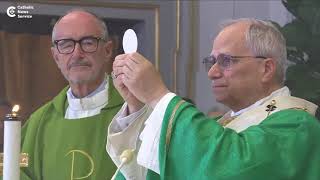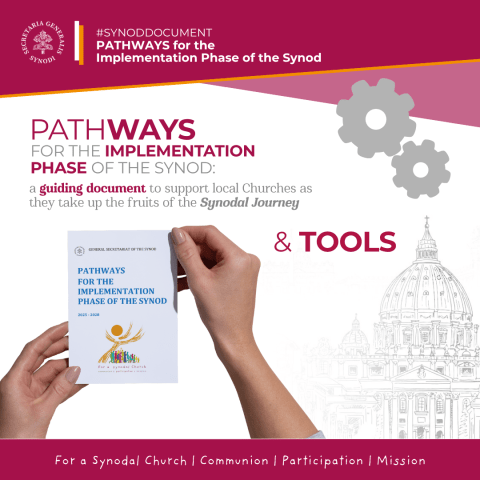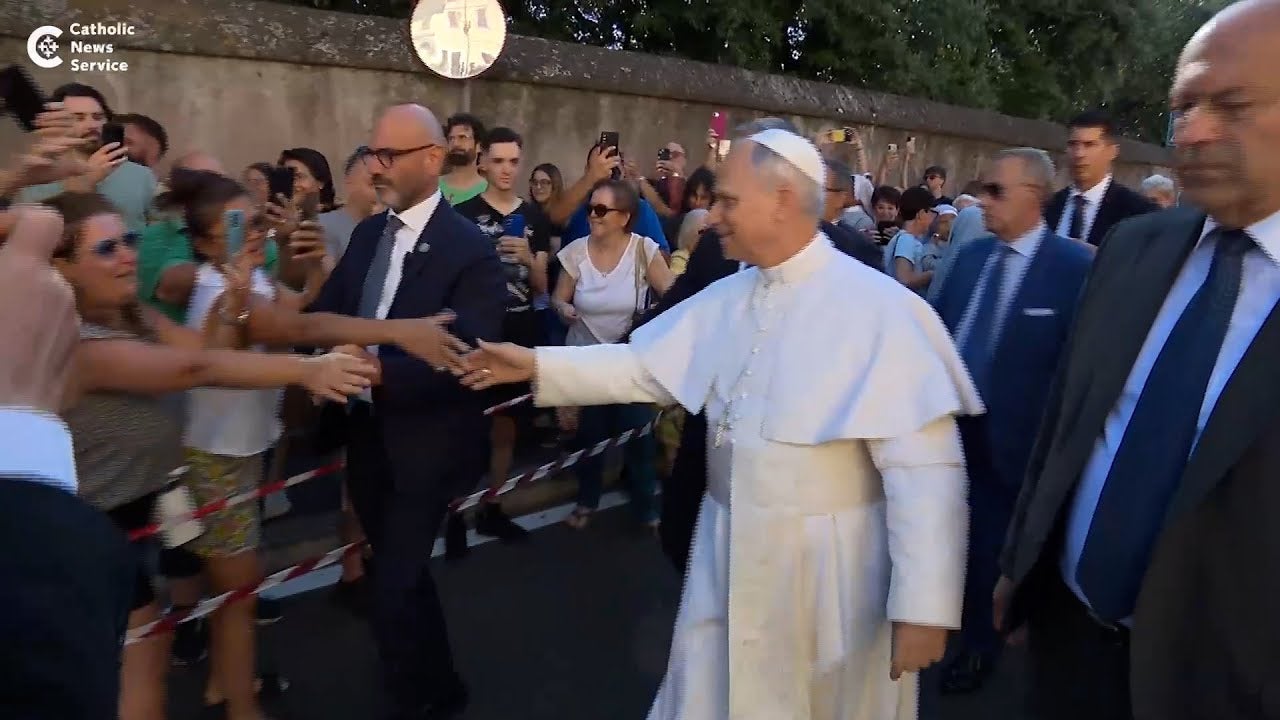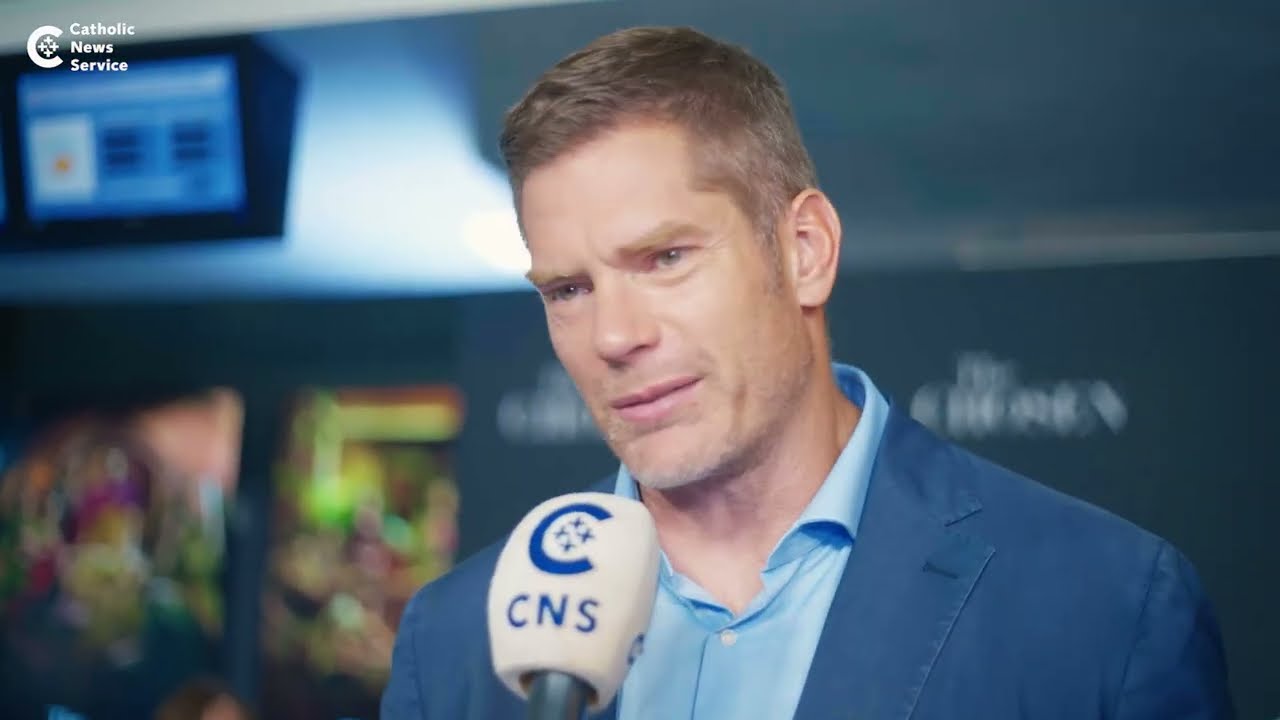Browsing News Entries
Catholic News Service in Rome wins nine awards for its work in Catholic media
Posted on 07/15/2025 08:30 AM (USCCB News Releases)
ROME (CNS) -- The Catholic News Service team in Rome won nine awards from the Catholic Media Association, which were announced during the 2025 Catholic Media Conference in Phoenix, Arizona. Incorporated in 1911, the Catholic Media Association is an organization of publishers and media professionals for a total of about 355 member organizations, which include 890 media professionals.
Catholic News Service has been providing complete, in-depth coverage of the popes and the Vatican for more than 70 years. Its six-person team is made up of three full-time reporters, one photographer, one multimedia journalist and one administrative assistant.
CNS took home two first-place awards with the following comments from the judges:
-- Best Coverage: Papal Trips with "Papal Trip to Venice" by Carol Glatz, Lola Gomez, and Robert Duncan.
"This package beautifully paints the pope's visit to Venice with its descriptive reporting and focus on setting the visual scene. The video and photographs that accompanied the writing brought the reader in to more fully experience the visit. The reporting offered clear coverage of the people's message to the people of Venice, and comprehensive reporting regarding the details of the one-day event."
Click through to see the stories, photos and video in this winning series:
Like Venice, people are beautiful, fragile, pope says in city built on water
Pope praises artists, encourages prisoners to never lose hope
Vatican releases list of papal liturgies, trip for April and May
-- First place for Best Reporting on the Celebration of a Sacrament for "The diaconate is ‘surrender’ to Jesus, U.S. archbishop says at ordination Mass" by Justin McLellan.
"The descriptive language in this piece is exceptional -- it captures the reader's attention, holds it and leaves them wanting more. The story is full of heart and creates a strong emotional connection with the reader."
Click below to see the story and photos:
Diaconate is 'surrender' to Jesus, U.S. archbishop says at ordination Mass
* * * *
CNS took home four second-place awards with the following comments from the judges:
-- Second place for Best Photograph, Scenic, Still-life or Weather for "A Swiss Guard at Easter Mass" by Lola Gomez
"The subject bursts into view in the photo's technicolor brilliance, which even gives the shallow depth-of-field background dynamic prominence."
-- Second place for Best News writing on a Local or Regional Event -- Wire Service for "Vatican sees spiritual value of Medjugorje, doesn't judge it supernatural" by Cindy Wooden:
"A quality article explaining the church's stance on visions."
-- Second place for Best Story and Photo Package by Two Individuals or More for "From on high: A rare glimpse from the top of St. Peter's Baldachin" by Justin McLellan and Lola Gomez:
"Representative of several strong submissions from this organization, this entry stands out for the unique details it presents regarding the historic preservation project it chronicles. It finds the right details to tease out to clarify both the historical significance of the project and the personal lives intertwined with it."
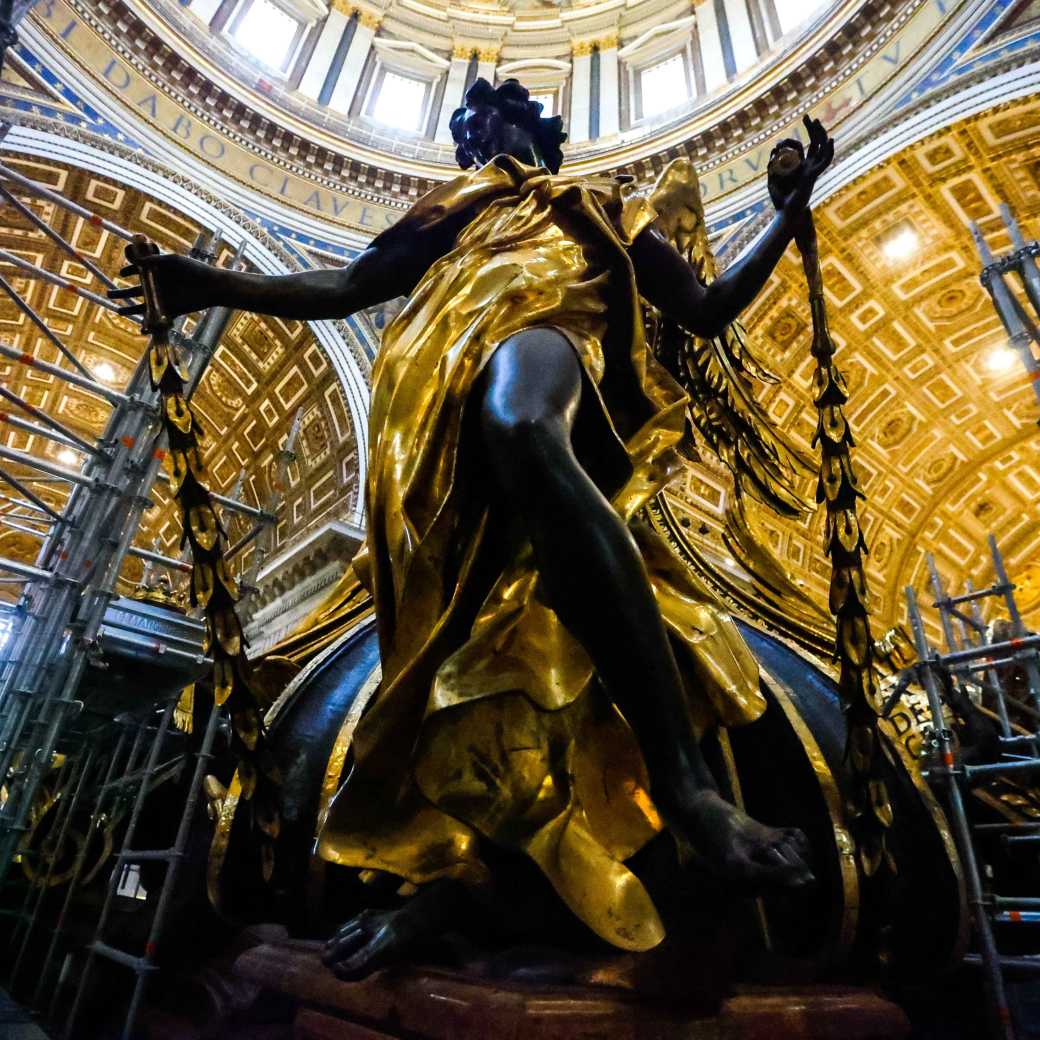
Since February the imposing 17th-century canopy, known as a baldachin, has been shrouded in scaffolding as restorers gradually worked their way up to the top of the 10-story structure, affording them the most intimate view of the towering structure seen by anyone since its last professional restoration in 1758, more than 260 years ago. Full story here: From on high: A rare glimpse from the top of St. Peter's baldachin
-- Second place for Best News Video -- Diocesan and National News Organizations for "In-depth with U.S. Vatican ambassador" by Robert Duncan and Carol Glatz.
"The set up was beautiful for an important interview. The good use of sound and visuals to bring a skilled journalist's one-on-one interview with the U.S. Vatican ambassador to the world, holding the viewer's interest in this podcast style approach."
****
CNS took home three third-place awards.
-- Best Feature Writing -- National Newspaper or Wire Service for "Angels or aliens? Some researchers say Vatican Archives hold UFO secrets" by Robert Duncan.
"This is an interesting story that would probably attract a wide variety of newspaper readers -- the headline is definitely an attention-getter. It is well-written and accessible. I found it interesting to think about what the possibilities might be for unearthing archived records regarding UFOs -- the article thus encourages ongoing thought about the topic. Great work!"
-- Third place for Best Coverage -- Papal Trips with "Papal trip to Indonesia, Papua New Guinea, Timor Leste and Singapore" by Cindy Wooden, Lola Gomez and Robert Duncan.
"What a great collection of stories! These are all very informative and even educational. I very much appreciated the effort and skill in bringing more obscure or unfamiliar stories to the forefront. The explanations within the articles are clear, and the writing is highly accessible. I really like the way the articles provide diverse perspectives and present differences evenhandedly. Bravo!"
Click through to see the stories and more photos in this winning series on the pope's visit to Asia and Oceania:
Pope in remote Pacific town: Match creation's beauty with beauty of love
Traditional respect for clergy in Timor-Leste must not be exploited, pope says
Both US presidential candidates espouse anti-life views, pope says
-- Third place for Best Video -- Catechesis, Diocesan and National News Organizations for "U.S. seminarians in Rome reflect on the Litany of Humility" by Robert Duncan.
"This engaging and informative video on the Litany of Humility takes the viewer on a journey to St. Peter's Basilica where seminarians who are being formed in Christ educate and inspire us. The use of music, historical images and highly professional videography draw us in. This short but impactful video is very well done."
- - -
Reporting by CNS Rome is made possible by the Catholic Communication Campaign. Give to the CCC special collection in your diocese or any time at: https://bit.ly/CCC-give
Jesus did not ignore those in need, and neither should Christians, pope says
Posted on 07/13/2025 08:30 AM (USCCB News Releases)
VATICAN CITY (CNS) -- To believe in and follow a loving and compassionate Christ is to allow him to enter one's heart and take on his same feelings, Pope Leo XIV said.
"It means learning to have a heart that is moved, eyes that see and do not look away, hands that help others and soothe their wounds, shoulders that bear the burden of those in need," he said in his homily, celebrating a morning Mass July 13.
The pope celebrated the Mass in the small Church of St. Thomas of Villanova, just across the main square from the papal villa in Castel Gandolfo. The pope arrived in the hilltop town south of Rome July 6 for a brief vacation until July 20.
In his Mass homily, the pope focused on the day's Gospel reading of the parable of the Good Samaritan.
"That parable constantly challenges us to think about our own lives," Pope Leo said. "It troubles our dormant or distracted consciences, and warns us about the risk of a complacent faith that is satisfied with the outward observance of the law but incapable of feeling and acting with the same merciful compassion as God."
"The parable is really about compassion," he said. It teaches that "how we look at others is what counts, because it shows what is in our hearts. We can look and walk by, or we can look and be moved with compassion."
"The parable speaks to us first about God's way of seeing us, so that we, in turn, can learn how to see situations and people with his eyes, so full of love and compassion," the pope said. In fact, the Good Samaritan is really a figure of Jesus, the son of God, who "regarded humanity with compassion and did not walk by."
This parable is so challenging for every Christian, he said, because "if Christ shows us the face of a compassionate God, then to believe in him and to be his disciples means allowing ourselves to be changed and to take on his same feelings."
"Once we are healed and loved by Christ, we too can become witnesses of his love and compassion in our world," which needs "this revolution of love," he said.
The Good Samaritan encountered the wounded man who had been walking down the road from Jerusalem to Jericho, Pope Leo said.
Today, that road is "traveled by all those who descend into sin, suffering and poverty," he said. It is traveled by "all those weighed down by troubles or hurt by life," those who "lose their bearings and hit rock bottom."
The road today is "traveled by all those people that are stripped, robbed and pillaged, victims of tyrannical political systems, of an economy that forces them into poverty, and of wars that kill their dreams and their very lives," he said.
"What do we do? Do we look and walk by, or do we open our hearts to others, like the Samaritan? Are we content at times merely to do our duty, or to regard as our neighbor only those who are part of our group, who think like us, who share our same nationality or religion?" he asked.
"Jesus overturns this way of thinking by presenting us with a Samaritan, a foreigner or heretic, who acts as a neighbor to that wounded man. And he asks us to do the same," Pope Leo said.
"Looking without walking by, halting the frantic pace of our lives, allowing the lives of others, whoever they may be, with their needs and troubles, to touch our heart," he said, is "what makes us neighbors to one another, what generates true fraternity and breaks down walls and barriers."
"In the end, love prevails and proves more powerful than evil and death," the pope said.
After the Mass, Pope Leo greeted many of the parishioners, priests and religious inside the church. He then walked the short distance from the parish to the papal villa along a route cordoned off by metal barricades, waving and greeting the thousands gathered in the square.
Parishes need to launch 'revolution of care' for the elderly, pope says
Posted on 07/10/2025 08:30 AM (USCCB News Releases)
VATICAN CITY (CNS) -- Pope Leo XIV called on every parish and church group or association to become part of a "revolution" of care and gratitude by regularly visiting older people.
"Christian hope always urges us to be more daring, to think big, to be dissatisfied with things the way they are," the pope wrote in his message for World Day of Grandparents and the Elderly, a church celebration that will take place July 27.
"In this case, it urges us to work for a change that can restore the esteem and affection to which the elderly are entitled," he wrote in the message released July 10.
The pope's message expanded on the theme chosen for this year's world day, which was taken from the Book of Sirach: "Blessed are those who have not lost hope."
The 2025 celebration marks the fifth edition of World Day for Grandparents and the Elderly and Pope Leo's first message for the day. Pope Francis instituted the world day in 2021; it is observed each year on the fourth Sunday of July, close to the liturgical memorial of Sts. Joachim and Anne, the grandparents of Jesus.
In his message for this year's celebration, Pope Leo said the Jubilee Year, which is a time of liberation from injustice and inequality, is an appropriate time for all the faithful to help older people "experience liberation, especially from loneliness and abandonment."
To help everyone participate in the Holy Year, especially those who are physically unable to make a pilgrimage to Rome, the Dicastery for Laity, Family and Life created a pastoral kit with suggestions for holding a Jubilee celebration in places where the elderly live.
"The grace of the Jubilee is always for everyone!" the dicastery wrote, indicating that the kit and other resources are available at www.laityfamilylife.va.
"Our societies, everywhere in the world, are growing all too accustomed to letting this significant and enriching part of their life be marginalized and forgotten," Pope Leo wrote, speaking of the elderly.
"Given this situation, a change of pace is needed that would be readily seen in an assumption of responsibility on the part of the whole church," he wrote.
"Every parish, association and ecclesial group is called to become a protagonist in a 'revolution' of gratitude and care, to be brought about by regular visits to the elderly, the creation of networks of support and prayer for them and with them, and the forging of relationships that can restore hope and dignity to those who feel forgotten," he wrote.
"That is why Pope Francis wanted the World Day of Grandparents and the Elderly to be celebrated primarily through an effort to seek out elderly persons who are living alone," Pope Leo wrote. "For this reason, those who are unable to come to Rome on pilgrimage during this Holy Year may obtain the Jubilee indulgence if they visit, for an appropriate amount of time, the elderly who are alone... making, in a sense, a pilgrimage to Christ present in them."
The church describes an indulgence as a remission of the temporal punishment a person is due for their sins. Pilgrims are able to receive a special indulgence during the Holy Year by visiting one of four papal basilicas in Rome or other designated sites and taking part in prayer, a liturgical celebration or the sacrament of confession.
Pope Leo wrote that "visiting an elderly person is a way of encountering Jesus, who frees us from indifference and loneliness."
"Embracing the elderly helps us to understand that life is more than just the present moment, and should not be wasted in superficial encounters and fleeting relationships," he said in his message.
"If it is true that the weakness of the elderly needs the strength of the young, it is equally true that the inexperience of the young needs the witness of the elderly in order to build the future with wisdom," his message said.
Grandparents offer examples of "faith and devotion, civic virtue and social commitment, memory and perseverance amid trials," he wrote. "The precious legacy that they have handed down to us with hope and love will always be a source of gratitude and a summons to perseverance."
Speaking as an older person, Pope Leo, who will turn 70 in September, wrote, "We possess a freedom that no difficulty can rob us of: it is the freedom to love and to pray," and to be there for one another in faith as "shining signs of hope."
"Let us lovingly pass on the faith we have lived for so many years, in our families and in our daily encounter with others," he wrote. "May we always praise God for his goodness, cultivate unity with our loved ones, open our hearts to those who are far away and, in particular, to all those in need."
"In this way, we will be signs of hope, whatever our age," he wrote.
Pope Leo XIV Accepts Resignation of Bishop Liam Cary of the Diocese of Baker; Appoints Rev. Thomas Hennen as Successor
Posted on 07/10/2025 08:30 AM (USCCB News Releases)
WASHINGTON – Pope Leo XIV has accepted the resignation of Bishop Liam Cary, 77, from the pastoral governance of the Diocese of Baker, and has appointed Reverend Thomas Hennen, as Bishop-elect of Baker. Father Hennen is a priest of the Diocese of Davenport and currently serves as the diocese’s vicar general and rector of Sacred Heart Cathedral in Davenport, Iowa. The resignation and appointment were publicized in Washington, D.C. on July 10, 2025, by Cardinal Christophe Pierre, apostolic nuncio to the United States.
The following biographical information for Bishop-elect Hennen was drawn from preliminary materials provided to the U.S. Conference of Catholic Bishops:
Father Hennen was born July 4, 1978, in Ottumwa, Iowa. Bishop-elect Hennen pursued studies at Saint Ambrose University in Davenport. He also studied at the Pontifical North American College in Rome, and the Pontifical Gregorian University, earning a bachelor’s in sacred theology (2003). He received a licentiate of sacred theology (2005) from the Pontifical Alphonsian Academy in Rome. Father Hennen was ordained to the priesthood on July 10, 2004.
Bishop-elect Hennen’s assignments after ordination include: parochial vicar, Prince of Peace parish in Clinton (2005-2010); campus minister and parochial vicar, Newman Center and Saint Mary in Iowa City (2010-2011); chaplain and theology teacher at Assumption High School in Davenport (2014-2017). He also served at Sacred Heart parish in Oxford Junction, Saint James parish in Toronto, Sacred Heart parish in Lost Nation and Saints Philip and James parish in Ground Mound (2015); chaplain and director of campus ministry at Saint Ambrose University in Davenport (2017-2021); parochial vicar at Saint Anthony parish in Davenport (2017-2018). Since 2021, he has served as priest moderator of Saint Andrew parish in Blue Grass and rector of Sacred Heart Cathedral in Davenport.
Bishop-elect Hennen’s additional responsibilities for the Diocese of Davenport have included: director of vocations (2011-2018); associate director of vocations (2018-2021); consultor and vicar general (2020-present). Bishop-elect Hennen speaks English, Spanish, and Italian.
The Diocese of Baker is comprised of 66,826 square miles in the State of Oregon and has a total population of 532,734 of which 33,356 are Catholic.
###
Pope prays for conversion of those resisting climate action at new Mass
Posted on 07/9/2025 08:30 AM (USCCB News Releases)
ROME (CNS) -- "We must pray for the conversion of many people, inside and outside of the church, who still do not recognize the urgency of caring for our common home," Pope Leo XIV said while celebrating a new formulary of the Mass "for the care of creation."
Far from the pounding organ of St. Peter's Basilica or the throngs of faithful sprawled across St. Peter's Square, the pope celebrated Mass July 9 to the accompaniment of chirping birds in the gardens of the papal villa in Castel Gandolfo, the traditional summer residence of the popes some 15 miles southeast of Rome.
The Mass was attended by the staff of the Borgo Laudato Si' ecology project -- a space for education and training in integral ecology hosted in the gardens -- as well as Vatican officials and Holy Cross Father Daniel Groody, an expert on migration and associate provost for undergraduate education at the University of Notre Dame in Indiana.
Although Pope Leo was scheduled to meet with Ukrainian President Volodymyr Zelenskyy later in the day, he was not present at the Mass.
Lamenting the natural disasters around the world that "are in part caused by the excesses of human beings, with their lifestyle," the pope urged the intimate gathering in his homily "to ask ourselves if we ourselves are living this conversion or not: how greatly it is needed!"
The formulary of the Mass "for the care of creation" was added to the Roman Missal -- the liturgical book that contains the texts for celebrating Mass in the Roman Rite of the Catholic Church -- by the Dicastery for Divine Worship and the Discipline of the Sacraments June 8.
The formulary, included among 17 other "civil needs" for which a priest can offer Mass, selects prayers and readings for the celebration of Mass that affirm the place of God's creation in worship.
While the pope's Mass was celebrated in Italian, parts of the Mass pertaining to the new formulary were read in Latin.
"In a burning world, be it because of global warming or armed conflicts," people today find themselves filled with fear, just as the disciples were in the face of a storm that was calmed by Christ, Pope Leo said in his homily. But, he added, "there is hope! We have found it in Jesus."
"The mission of safeguarding creation, of bringing peace and reconciliation" is "the mission which the Lord has entrusted to us," Pope Leo said. "We listen to the cry of the earth, we listen to the cry of the poor, because this cry has reached the heart of God. Our indignation is his indignation; our work is his work."
The church, he added, must speak prophetically before the climate crisis "even when it requires the boldness to oppose the destructive power of the 'princes' of this world."
"The indestructible covenant between creator and creatures mobilizes our intellect and efforts, so that evil may be turned to good, injustice to justice, greed to communion."
Quoting at length from Pope Francis' 2015 encyclical "Laudato Si', on Care for Our Common Home," Pope Leo recalled the harmony with creation that St. Francis of Assisi achieved in his lifetime to the point of calling created things "brother, sister, mother."
"Just one contemplative gaze can change our relationship with created things and bring us out of the ecological crisis that has, as its cause, the breakdown of relationships with God, neighbor, and the earth because of sin," he said.
Pope Leo was scheduled to spend two weeks in July at the papal summer residence in Castel Gandolfo, reviving a custom skirted by Pope Francis. The pope moved there July 6 following his noontime recitation of the Angelus in St. Peter's Square.
“The Catholic Church maintains its stance of not endorsing or opposing political candidates.”
Posted on 07/8/2025 08:30 AM (USCCB News Releases)
WASHINGTON - In response to the recent interpretation of the Johnson Amendment publicized by the Internal Revenue Service (IRS), the U.S. Conference of Catholic Bishops (USCCB) offered a statement from its spokesperson, Chieko Noguchi, executive director of public affairs. The Johnson Amendment defines guidelines for the tax-exempt status of a church or other nonprofit regarding political activities and endorsing or opposing candidates for public office.
“The IRS was addressing a specific case, and it doesn’t change how the Catholic Church engages in public debate. The Church seeks to help Catholics form their conscience in the Gospel so they might discern which candidates and policies would advance the common good. The Catholic Church maintains its stance of not endorsing or opposing political candidates.”
###
Vatican provides guidelines to help local churches, bishops implement synod on synodality
Posted on 07/8/2025 08:30 AM (USCCB News Releases)
VATICAN CITY (CNS) -- Local churches and bishops worldwide will be instrumental in helping implement the proposals and foster the spirit of the 2024 final document of the Synod of Bishops on synodality, the Vatican synod office said.
To more effectively carry out the mission of evangelization, the implementation phase of the synod "aims to examine new practices and structures that will make the life of the church more synodal," the General Secretariat of the Synod of Bishops said in a new set of guidelines released July 7.
"Concretely, the priority is to offer the people of God new opportunities to walk together and reflect on these experiences in order to reap their fruits for the mission and share them," the text said.
The 24-page text, titled "Pathways for the Implementation Phase of the Synod," is a guide for bishops and synodal teams, and an invitation to them to share their initiatives as they apply the synod on synodality's final proposals locally. It also seeks to answer some key questions the office received recently. The text was released in multiple languages at synod.va.
Divided into four chapters, the document offers responses to: What is the implementation phase and what are its objectives?; Who will participate in the implementation phase and what are their tasks and responsibilities?; How to engage with the 2024 synod assembly's final document during the implementation phase?; And what method and tools can help shape the implementation phase?
The guidelines underline how the local churches must play an active role in this phase, including by reaching out to diverse communities such as the marginalized, young people and those resistant to the synodal process, because, "in order to truly walk together, we cannot lose the contribution of their point of view."
Engagement should extend beyond the parish to include schools, hospitals, prisons and digital platforms, it said, and relations with religious communities, movements and associations should be strengthened to further exchange the variety of gifts toward mission.
Synodality "cannot be a path limited to a core group of 'supporters,'" it said.
"On the contrary, it is important that this new process contribute concretely 'to expand possibilities for participation and for the exercise of differentiated co-responsibility by all the baptized, men and women' in a spirit of reciprocity," it said. "Moreover, it is crucial that it aims to involve those who have so far remained on the margins of the ecclesial renewal process established by the synod."
The diocesan or eparchial bishop is the first person responsible for the implementation phase, the guidelines said. "It is his responsibility to initiate it, officially indicate its duration, methods and objectives, accompany its progress and conclude it, validating its results."
This phase "will be an appropriate opportunity to exercise authority in a synodal way," it said, reminding bishops they are not alone and should encourage all members of the church to share the journey together.
Synodal teams and participatory bodies "will be essential in the implementation phase as well," the guidelines said, so "existing teams should be valued and, where necessary, renewed; those that have been suspended should be reactivated and appropriately integrated; and new teams should be formed where they have not been established previously."
Every diocese or eparchy also needs to register its synodal team with the synod office by requesting a link to its database at synodus@synod.va to aid communication and effective coordination, it said.
The implementation phase of the synod was opened by Pope Francis in November 2024 when he called upon local churches, bishops' conferences and others to implement "the authoritative proposals contained in the document through the processes of discernment and decision-making provided for by law and by the document itself," the late pope wrote.
The three-year period of implementation and evaluation on the local, national, regional and international levels will culminate in a "celebration of the ecclesial assembly" in October 2028 at the Vatican "to share the fruits of the implementation phase and to have a kind of evaluation," Xavière Missionary Sister Nathalie Becquart, undersecretary of the Synod of Bishops, said.
"The best way to start the implementation phase is really to read the final document of the synod. That is the reference for this implementation phase," she said in an interview with Vatican News July 7.
The new guidelines then "are a kind of tool to help to dive into the final document of the synod and to take it up in a discerning way, to see how to implement it at the local level, also with this creativity that is coming from the Holy Spirit, because you can’t have just one way for everybody all over the world," she added.
The synod's final document "is the point of reference for the implementation phase," the guidelines said.
The mission of proclaiming the Kingdom of God "constitutes the backbone" and final goal of the synod's final document, the text said. "Reflections on the tools to be adopted or the reforms to be implemented should always be placed within the perspective of the mission."
The final document "firmly promotes a church that is increasingly courageous in its outreach," it said, and "it embraces the conciliar vision of a church in the world, in dialogue with everyone, with other religious traditions and with the entire community."
"Growing as a synodal church capable of dialogue has a prophetic value that includes a commitment to social justice and integral ecology. These dimensions cannot be neglected in the implementation phase, leading to the creation of opportunities for dialogue based on the concrete needs of the territories and societies in which we live," the text said.
Sister Becquart said the guidelines and the implementation phase are a prime opportunity for the "exchange of gifts" between the local churches, which is "a core notion of the final document, a core notion of a synodal church."
"We all have something to give and something to receive," she said. "This document is also really to highlight that you can't just do your synodal conversion alone, but it's very important to work together as different local churches."
After 12 years, locals welcome pope back to his summer home
Posted on 07/7/2025 08:30 AM (USCCB News Releases)
CASTEL GANDOLFO, Italy (CNS) -- After more than a decade without its most famous vacationer, the quiet town of Castel Gandolfo once again counts the pope among its summer residents.
Pope Leo XIV became the 16th pope to reside in the papal summer residence when he moved there July 6, following the recitation of the Angelus in St. Peter's Square.
"This afternoon, I will travel to Castel Gandolfo, where I intend to have a short period of rest," the pope told pilgrims gathered in the square. "I hope that everyone will be able to enjoy some vacation time in order to restore both body and spirit."
The tradition of popes escaping the summer heat of Rome for the cooler Alban Hills began with Pope Urban VIII in 1626. While Pope Benedict XVI spent nearly three months in the papal villa during the summer of 2012, his successor, Pope Francis, chose not to stay there, opting instead for his Vatican residence at the Domus Sanctae Marthae.
In 2016, Pope Francis converted the papal property into a museum, opening the villa and gardens to the public.
That decision transformed the character of tourism in the town, said Marina Rossi, a local resident who has operated a mosaic workshop along the town's main drag for more than 30 years.
"During the week there wasn't this flow of people," she told Catholic News Service July 1, since the popes only presented themselves publicly to pray the Angelus on Sundays. "Instead, by opening the palace and the pontifical villas, the type of tourism has changed," shifting from frugal pilgrims to paying visitors. As a result, "the last 12 years were good for us."
Still, she said, the return of a pope is "fantastic."
"It's an important showcase" for the town, Rossi said. "We're happy, yes."
Rossi, an artist, said she and others had considered creating a portrait of the pope, adding, "Yes, it's an idea we've had; right now, we are doing stuff a bit different, more simple, because making a portrait is not the most 'sell-able' right away."
Assunta Ferrini, who manages Sor Capanna, a restaurant right off the square at the foot of the papal palace, said the town has not lacked tourists in the pope's absence.
"The tourists came, many of them," she told CNS. "But to have a pope return is always an honor for the town, that he comes here to meet us."
At a local coffee shop, barista Stefano Carosi echoed that sentiment. "To have the pope here among us after so long is a beautiful thing," he said. "We've waited for it for so long."
Without the steady presence of Pope Francis, he added, the town was "without that spark, that light, but now it seems like these 12 years have flown by and we hope that everything may return as before."
The Chosen's 'endgame' is to point people to Jesus, series' creator says
Posted on 07/5/2025 08:30 AM (USCCB News Releases)
VATICAN CITY (CNS) -- Just as "The Chosen" wrapped up the release of Season 5 in the U.S., the hit series about Jesus and those who knew him was set to stream internationally in select countries, including Italy, starting in July.
The Vatican hosted a news conference and a premiere of one of the new season's episodes in its film theater June 23 before select cast and crew members hit the red carpet at a Rome theater for a special screening of the episode, "The Last Supper," with members of the public, including numerous seminarians, priests and nuns living in the Italian capital.
The goal of the series is "for people to get a deeper connection to Christ and to have a more intimate relationship with him," Jonathan Roumie, who portrays Christ in the series, told Catholic News Service at the red-carpet event.
"I think that is the goal for all of us, for people to go directly to the source and to understand what it is that Jesus actually said, what he meant, what his example was, and how we can incorporate that into our own lives and be better people to each other and better servants of the Lord," said Roumie.
Elizabeth Tabish, who portrays Mary Magdalene in the series, told CNS that the historical drama resonates with its audience because "we start this entire series with all of these saints before they're saints. And they're really messy. They have their own vices and challenges."
"When we meet Mary Magdalene, she is struggling with demon possession and oppression and PTSD from an assault and suicidal thoughts and an addiction. This is meeting someone in their own personal hell," she said, but "it's been so beautiful to witness her story of redemption."
Mary Magdalene's faith journey is depicted as a "continued story of constant redemption and of constant growth, where she is learning to stop thinking about her past and really let go of her past and her shame and her anxieties," to focus on Jesus and "to see how that transforms her," Tabish said.
In Season 5, her character is "so focused on trying to help Jesus and protect him, and it's just such a beautiful place to see her in," she said. "She becomes quite gutsy and outspoken and determined, and I love that, to see a female character go from a real victim to someone so empowered."
"The Chosen" debuted at the end of 2017 as an online series, which has since expanded to theatrical releases, grossing nearly $140 million globally at the box office.
With more than 900 million episode views and a global audience exceeding 280 million, the series' creator and director, Dallas Jenkins, said its "secret sauce" is portraying Jesus and those who knew him in a way that is less formal or stiff.
When meeting fans, he said at the news conference, they typically say that what they love about the series is "it just feels so real. It feels so human."
"Those human moments do not detract from the divinity (of Christ) and do not detract from the spirituality" of the events and teachings they depict, he said.
"In many ways, they make them even more beautiful that the God of the universe came to Earth, Emmanuel, God with us, and laughed with his friends at a wedding," he said. Seeing the young mother, Mary, wash her child's hair or tend to him are "the moments that people have responded to so significantly."
Many of the theological disagreements about Mary and Jesus, said Jenkins, who is an evangelical Christian, "took place after he was here. They take place after the Gospels."
"I think that by focusing on the humanity of these people while not ignoring the divinity and not ignoring the supernatural, but focusing on the humanity -- that has seemed to be what has connected people of multiple faiths, that we can all appreciate that and identify with it and then be drawn closer to Jesus because of that," he said.
Dominican Father Patrick Briscoe, editor of Our Sunday Visitor, who moderated the press conference, told CNS the series is a "great gift" for Catholics because it offers an opportunity for engagement and genuine conversation.
"As a priest in ministry, what's been so beautiful is that people have come to me with questions, very specific questions about Scripture that maybe they would have never had before because they've realized that a decision was made in the way that a scene was portrayed in the show and they wanted clarity about it," he said.
"It's actually raised important questions about how to interpret the Scriptures, about the meaning of particular biblical scenes, and those conversations wouldn't have happened otherwise. So I found it a great source of engagement and light," he said.
According to the series' producers, about 30% of viewers belong to no faith tradition at all.
Jenkins said the "endgame" of the show is not popularity or profit, but "to remind people that these events were real" and that biblical figures are more than literary characters or subjects depicted in art.
"The show is to point you towards the real person of Jesus and to point people towards people like yourself. To get disciples and to worship and to pray," he said.
U.S. Bishops’ President Reacts to Passage of One Big Beautiful Bill Act
Posted on 07/3/2025 08:30 AM (USCCB News Releases)
WASHINGTON – Reacting to the passage of the One Big Beautiful Bill Act by the U.S. Congress, Archbishop Timothy P. Broglio, president of the U.S. Conference of Catholic Bishops, lamented the great harm the bill will cause to many of the most vulnerable in society, making steeper cuts to Medicaid and clean energy tax credits, and adding more to the deficit. While the bishops had commended the positive aspects of an earlier version of the bill, the restriction on federal funds to abortion providers such as Planned Parenthood was reduced to one year, the parental choice in education provision was greatly weakened, and the restriction on federally funding “gender transition” procedures was removed.
Archbishop Broglio said:
“My brother bishops and I have repeatedly and consistently urged lawmakers to use the budget reconciliation process to help families in need and to change course on aspects of the bill that fail the poor and vulnerable. The final version of the bill includes unconscionable cuts to healthcare and food assistance, tax cuts that increase inequality, immigration provisions that harm families and children, and cuts to programs that protect God’s creation. The bill, as passed, will cause the greatest harm to those who are especially vulnerable in our society. As its provisions go into effect, people will lose access to healthcare and struggle to buy groceries, family members will be separated, and vulnerable communities will be less prepared to cope with environmental impacts of pollution and extreme weather. More must be done to prevent these devastating effects.
“The Catholic Church’s teaching to uphold human dignity and the common good compels us to redouble our efforts and offer concrete help to those who will be in greater need and continue to advocate for legislative efforts that will provide better possibilities in the future for those in need.”
###

